In the ground game to engage Black Milwaukee voters, signs of waning enthusiasm for 2020 rematch
Calena Roberts has voted in 13 presidential elections. Six times, the 70-year-old great-grandmother picked the next commander-in-chief. To her, voting means “our right to live.”
In Wisconsin, Roberts is the kind of voter targeted by everyone: the Democrats she has supported since 1971, Republicans who believe President Joe Biden’s support is slipping, and the groups that work each presidential election to either boost or blunt voter turnout in the state’s largest city.
That’s because Roberts is one of the most sought-after voters in this battleground state: She’s Black, she lives in Milwaukee, and she never skips a ballot.
Black voters in Milwaukee play a crucial role in the outcome of each presidential contest in Wisconsin, the nation’s quintessential battleground. They make up less than 10% of the state’s electorate but carry enough voting power to deny national Democratic victories if turnout in the city’s Black neighborhoods is down.
The Milwaukee Journal Sentinel is spending 2024 examining the experience of Black voters in the state’s largest city, first exploring issues that affect turnout.
Black voters in Milwaukee are disproportionately affected by limits on voting for incarcerated individuals and a 2015 law that requires voters to show photo identification before casting ballots, activists and voters told the Journal Sentinel.
But enthusiasm for candidates matters most, they said.
That's underscored by a new Journal Sentinel analysis of voting data from Milwaukee's predominately Black wards.
Since 2004, turnout among Black voters in Milwaukee has significantly lagged white voter turnout during presidential contests, with the exception of 2012 — when then-President Barack Obama's re-election bid triggered unprecedented levels of voting in the city.
The turnout in majority-Black wards almost was 79% in 2012, compared with an average of 81% in majority-white wards.
While predominantly white wards continued steady turnout at 77% in 2016 and 84% in 2020, Black voter turnout experienced a steep decline, falling in 2016 to around 58%, and then again to around 51% in 2020.
That paints a troubled picture for Democrats heading into a potential rerun of the 2020 matchup.
Biden, the Democratic incumbent, is not — at this point — inspiring broad excitement among Black voters interviewed by the Journal Sentinel who traditionally vote for Democrats.
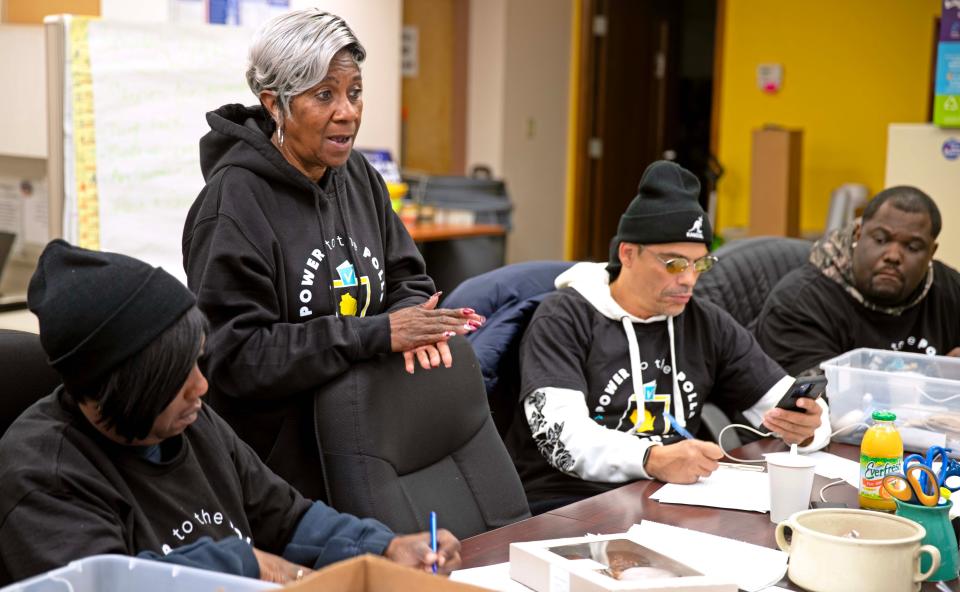
Roberts knows this. While replicating what Obama represented to Black Milwaukeeans is likely impossible, she says, the campaigning from the nation's first Black president does present a roadmap for other candidates in engaging voters.
“He had a message. He had a message that we could relate to. It was almost like finally we could hear. We could hear Dr. King again,” Roberts said.
"If you're not talking a manner that addresses my needs, concerns and all that to the voter, then I can't get hyped up.”
To combat that lack of enthusiasm, Roberts and others tasked with motivating voters to support Biden are building urgency by focusing on broader issues like the future of democracy.
Roberts is spending her retirement working as political director for Democratic voter outreach group Power to the Polls. One word comes to mind when she’s asked about 2024: nervous.
“My kids, growing up, knew the poll was the thing. And when you turn 18, you got to vote and here’s what it means — I tell them some of the stories about how before Black people could vote, they had them counting jellybeans and all kinds of stuff like that,” Roberts said, referring to a Jim Crow-era law requiring to require Black voters to guess the number of jellybeans in a jar in order to vote.
“People went through a lot. It wasn’t just given to us. We had to fight. We died for the right to vote. And you can’t just blow that off.”
A grant from the Pulitzer Center supported reporting for this story.
For organizers, the ground game has already started
Three hundred and fifty-seven days before the 2024 presidential election, Ken Ezell is standing on a sidewalk in Milwaukee’s Harambee neighborhood holding a clipboard with a list of questions.
The neighborhood namesake means "all pull together" in Kenya's language of Swahili. Ezell's group has a similar mission. While focused on voting, the organization's staff often connects people with job opportunities and finds other ways to support families they meet at the doors.
Ezell is a lead ambassador for Black Leaders Organizing Communities, known as BLOC — a Democratic and union-funded organization focused in part on boosting voter participation in Milwaukee’s Black neighborhoods.
BLOC is one of a handful of organizations in Milwaukee centered on Black turnout, which has again emerged as a top priority for Democratic Party leaders seeking to protect Biden’s narrow 2020 victories in Wisconsin, Michigan, Pennsylvania and Georgia from swinging back to Trump amid the president’s low approval ratings.
Ezell, 54, and four others huddle together to agree on a plan: find the people who are home today and talk to them about the next presidential election, election dates over the next year and an upcoming toy drive that could benefit their families.
One piece of information the five canvassers need to get to these prospective voters is where to vote now that a popular early voting site on the city’s north side is being shut down. Another hurdle in a long list, Ezell said.
In both the 2020 and 2022 general elections, about 30% of the absentee ballots cast in the city during early voting came from the site — accounting for more than 18,200 and 8,500 ballots, respectively, according to the city’s Election Commission.
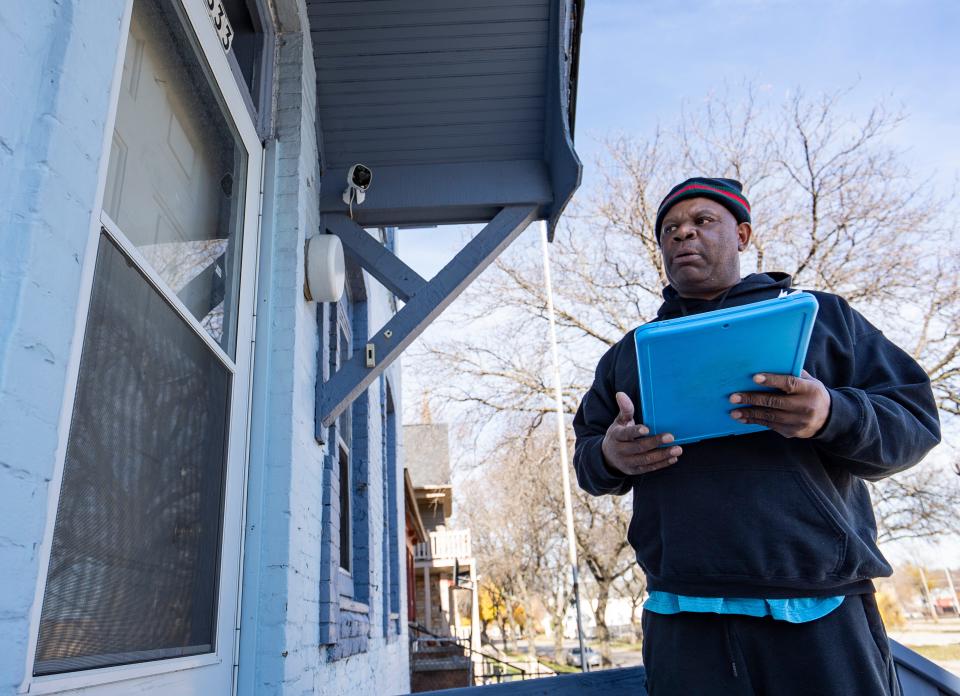
The Milwaukee Common Council approved a new nearby location in December, but on this November day, the deal wasn't done yet, hampering Ezell's crew's efforts to get good information to voters.
“That’s a big topic because that’s a big outlet for Black and brown people,” Ezell said. It’s another challenge that affects Black Milwaukee voters disproportionately, which includes navigating the state’s voter ID law and the voting rules for those who have been incarcerated.
Before Ezell and his crew of four left to knock on doors that day, BLOC program director Keisha Robinson reminded a room of more than two dozen workers known as ambassadors to share with prospective voters that convicted felons may vote if they have completed their sentence, a development known as “off paper.”
This is a key piece of information, Ezell said. Wisconsin has one of the highest incarceration rates of Black men in the nation.
“I’ve been to prison three or four times and I really understand that you have to be here and be a participant in the change,” he said.
Ezell starts with a two-story duplex painted shades of light blue. No one answers. Ezell climbs stoop after stoop on North Vel Phillips Avenue until a man wearing a Packers sweatshirt comes to the door and stops Ezell before he can start his pitch: “I’m a voter. I’m a voter.”
Even though the man assures Ezell he’s already planning to vote next year, it’s Ezell’s cue to run through the logistics that can turn into reasons to stay home for some voters: Be sure to bring a photo ID. Here's when you'll vote. Let's look up your polling place.
Inevitably, conversations turn to an impending 2020 rematch next fall.
How are voters feeling about another round of Donald Trump vs. Biden? Martez McGee, who is canvassing this neighborhood with Ezell, audibly winces while walking down the sidewalk to the next house.
“They’re not going to vote, if anything,” McGee predicts, based on his conversations thus far while knocking doors.
McGee, 30, says he hears prospective voters praising former President Trump for the three rounds of stimulus checks issued during the early years of the coronavirus pandemic.
“But I’m like, that wasn’t enough,” McGee says. He says his response is to focus on job opportunities created under Biden.
A man emerges from one duplex and meets the canvassers. They learn he isn’t familiar with upcoming election dates and doesn’t have an ID, which he will need to vote, nor does he have a computer and a working phone.
But he assures them, “believe you me, I’m gonna vote. I do not want Donald Trump.”
Ezell said he expects enthusiasm to vote to be affected by the likely candidates.
“Yes, because people think Biden got in and ain’t did nothing and a lot out here think Trump is superman” because of the stimulus checks. Some think Trump “is a cool dude — or a roughneck— and think Biden is too soft,” he said.
Ezell said most people he encounters don’t believe in leadership, which gives them little incentive to clear the hurdles to vote.
“They don’t trust the president. They don’t trust in people in office and believe every person we put in office always go the opposite way on this, because most of them do.”
"My message to them is to exercise your right to vote. It do matter who you vote for but at least get out and vote, period. Don't lose your right — they try and take that away, too.”
2016 was a wakeup call for Milwaukee Democrats
The 2016 election is a demarcation line for Milwaukee Democrats, when the power of Black voters in elections was defined through Hillary Clinton's unexpected loss to Donald Trump.
It was the first test of the unprecedented voter engagement Obama drew in 2008 and 2012 and proved that unlike in Madison, a Democratic stronghold where voting levels are generally always high, candidates play a significant role in whether Black voters in Milwaukee will turn out.
Obama's appeal to Black voters was unprecedented. Roberts attributes Obama's support to the historical significance of his candidacy, but also his broad message.
"Some folks were very excited that he was running and then there was this stillness that came over … some people were like, 'they'll kill that man,'" she said about Obama's 2008 campaign. "So that was a fear but I think, too, it was his message and the power in which he delivered it."
There was a sense after those elections that Black voters "showed up for Obama so they're just going to be regular voters ... not understanding it was tied very much to a personal connection to Obama and how he spoke to us," Angela Lang, executive director of BLOC, said.
"I think that was a huge wake-up call that you can't take for granted Black voters."
Consider the statistics:
Wisconsin's voter turnout in the 2016 election was the lowest in two decades, with 3,000 fewer people voting for a presidential candidate that year than in the U.S. Senate race on the same ballot.
Turnout was down especially in the state's most populous county, where Hillary Clinton received about 39,000 fewer votes than Obama did in 2012. Vote totals in Milwaukee County were even lower than the 2004 election turnout when Obama was not on the ballot.
Citywide turnout in 2016 dropped from 66% to 57% of voting-age residents and declined by more in majority-Black neighborhoods.
In the 11 wards in Milwaukee that are more than 95% Black, voter turnout dropped from 75% in 2012 to 55% in 2016.
Milwaukee's voter turnout — and Black voter turnout — was not the biggest reason Clinton lost Wisconsin. It had more to do with a wave of rural and white, non-college-educated voters breaking for President Donald Trump.
But it played a key role.
U.S. Rep. Gwen Moore, a Democrat from Milwaukee, described the city during the 2016 campaign cycle as "one of those Western movies, where you can see the tumbleweeds rolling, blowing down the street. It was so quiet."
Moore said when she learned Clinton wasn't going to campaign in the state, she knew the election would not go her way.
Lang said following Clinton's loss, she remembers “being very frustrated by the narratives" in explanations for Trump's win in 2016, prompting the creation of BLOC.
“I literally had someone say, 'if you people just would have voted, we wouldn't be here,'" Lang said. "And I'm like, 'you know there's 52% of white women that voted for Trump, right?'"
“And then shortly after that, there was a national article … and they interviewed Black men in a barber shop here. And they were like, ‘I wasn't engaged. I didn't feel strongly that either candidate was going to do anything for me. So, I just sat it out.’ And that's the narrative that we need to be talking about,” Lang said. “People didn't get that door knock.”
Four years later, voter turnout in predominantly Black neighborhoods dropped even more.
Heading into 2024, polling gives Democrats ominous signals about a repeat of 2016's outcome.
Just 22% of Black voters in Wisconsin are feeling very enthusiastic about voting in 2024, compared to 48% of white voters, according to recent polling by the Marquette University Law School. Fifty-five percent of voters who identify as Republicans said they were very excited about voting this year while 44% of Democrats said they were.
Lang said recent voting rule changes — a new voter ID law in 2015 and, in 2020, practically daily changes to how ballots could be cast — have also made a lasting mark on turnout in Black neighborhoods in Milwaukee.
“All of that that sticks with people, right?” Lang said. “Almost like death by a thousand cuts type of things. And it makes our job difficult, because we always have to relay that information as quickly as we can, when it also feels like it's changing by the hour.”
On top of that, the presidential candidates since Obama in 2012 may not “spark the most enthusiasm in our community.”
“And so then we hear a lot of conversations of, ‘I'm tired of voting for the lesser of two evils,’ Lang said.
“Now, we're having conversations about harm reduction, and like, broader conversations about the fate of democracy at this point. And it doesn't feel like that 2008, 'I'm excited to vote for someone.' I haven't seen that energy in a while.”
Heading off voter apathy is crucial for Democrats in a state where statewide races are often decided by a few thousand votes, and where victories run through Milwaukee and Madison.
The state's two largest cities are both consistent in their voting patterns — overwhelmingly Democratic. But while Madison had turnout of at least 70% in the past five presidential elections, and more than 83% in 2020, Milwaukee's turnout ranged from 56% to 66%, and was under 60% in the last election.
In 2020, Biden won Wisconsin by fewer than 21,000 votes. Four years prior, former President Donald Trump won the state by almost the same margin.
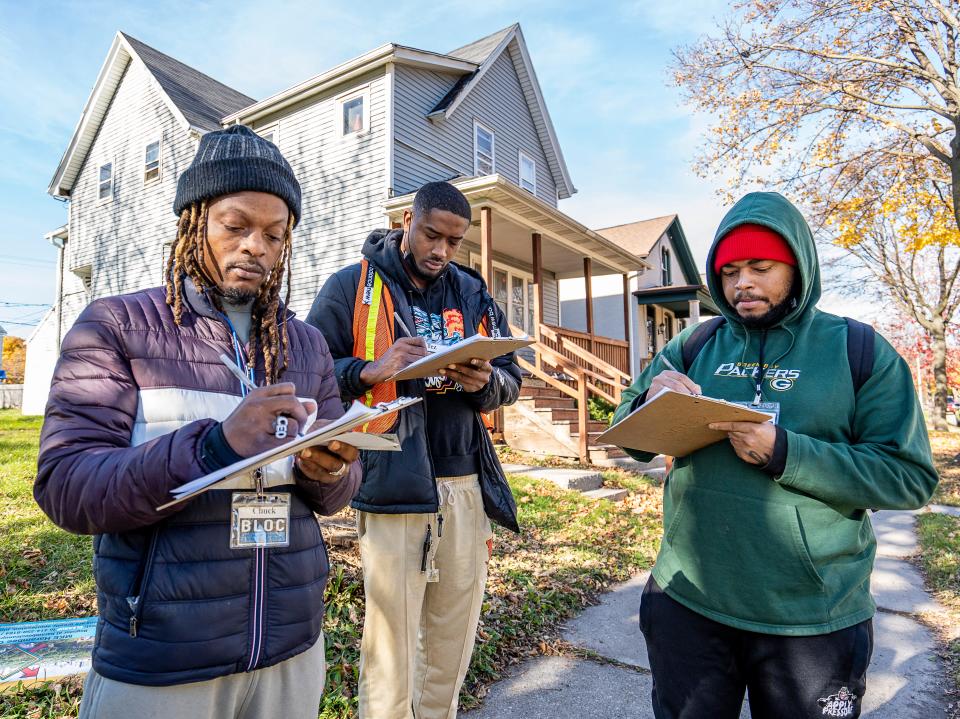
Republicans see opportunity to move the needle
Republicans see 2024 as an opportunity to move the needle in Milwaukee, enough to capture the statewide vote.
The Republican National Committee selected Milwaukee as the 2024 national convention site. And Republican Party of Wisconsin Chairman Brian Schimming sees Biden’s low popularity in Wisconsin as a way for the GOP to find a foothold in a traditionally Democratic demographic.
“You’ve got to be there,” Schimming said in an interview. “You can't show up every two years and have people believe you.”
In 2020, the state GOP opened an office in the Harambee neighborhood, on the corner of East North Avenue and North King Drive, to boost outreach to Black voters in Milwaukee.
More: 2024 RNC host committee deposits $100,000 at Milwaukee's Columbia Savings & Loan
Schimming said he made it a priority to hire the office’s dedicated workers before filling 50 other positions the party is seeking for the 2024 election cycle, in addition to launching field organizing teams and other efforts to engage Black voters in Milwaukee.
“You got to be out there and understand what the problems are, and if you don't, you're not going to either come with solutions or frankly just be able to sit down and talk things through,” Schimming said. “You got to go to where the problems are and if you're not willing to do that, you don't deserve to win.”
Schimming said recent polling shows Republicans could have a shot at winning over some Black voters.
“I don't have illusions about us suddenly getting 50% of the vote or something,” Schimming said. But he pointed to a recent NYT/Siena poll showing 22% of Black Wisconsin voters polled said they would vote for Trump over Biden in 2024. That’s up from a NYT/Siena poll in 2020 showing 17% of all non-white Wisconsin voters planned to vote for Trump that year.
“I think there's opportunity there for Republicans,” Schimming said.
“Wisconsin is truly one of the last purple states where you can move some numbers — and you don't have to move like 12 percent,” he said. “We dig into Milwaukee and get another couple points out of there and they have big, big, big problems.”
He said the effects of inflation could help Republicans make their case.
“Folks in certain cities are getting punished at least as hard if not harder than others ... it’s an opportunity for us to go, 'Look, when you walk into the polling booth the lever that says Democrat or a piece of paper that says Democrat, it's not a default button,'” Schimming said.
But the fact that in early 2023, a Republican member of the Wisconsin Elections Commission praised GOP campaign efforts to discourage Black voter turnout will be a hurdle for Republican outreach, according to interviews with Black Milwaukeeans.
Commissioner Bob Spindell praised decreased turnout in Milwaukee and especially in Black and Latino neighborhoods, arguing the lower voting participation is a result of Republican campaigning that has effectively neutralized Democratic candidates to the traditionally Democratic voters.
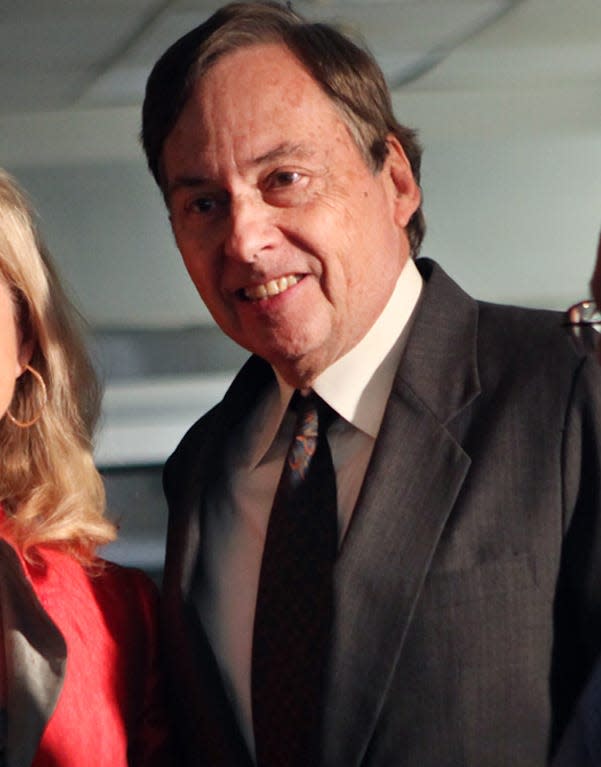
At a December 2022 event, Spindell said Republicans in the Fourth Congressional District in Milwaukee focused on turning off Black voters to Democratic candidates, a strategy he acknowledged could keep them from voting altogether.
"We will continue to be working in the city of Milwaukee, get people understanding that the leaders for the Democratic Party are not the ones for them. And maybe they’re thinking, the Republican ones aren’t any good either, so we point out to them, the Democratic ones are equal to or worse than the Republican ones, and they say ‘I’m not going to vote for them,'" he said a Fourth Congressional District GOP Christmas Party.
"If the African American population does not like your candidate they don’t show up. And when they like a candidate they show up and vote along that line. And so we work really hard along that line also."
Lang said the episode lingers in the memories of some of the more engaged voters.
"He said the quiet part out loud, I think is everyone's general sense of a consensus," Lang said. "All of us have been organizing behind the scenes knowing that they're trying to limit Black voter turnout. But to say it, and to admit it, was like, whoa.
"And then knowing that this came from an election official did not sit well with a lot of people and the fact that he said it so pointedly about the Black community — I think that was agitational enough for people to be like, 'Great. I'm voting for the next million cycles now. They clearly don't want me to vote.'"
Schimming said Spindell's comments were likely unartful ways to promote outreach in Black neighborhoods.
"Perhaps his statements weren't as artfully put as they could be, but I don't doubt that what he means is that we are going to continue to work those neighborhoods and other neighborhoods in Milwaukee," Schimming said in an interview with Wisconsin Public Television last year.
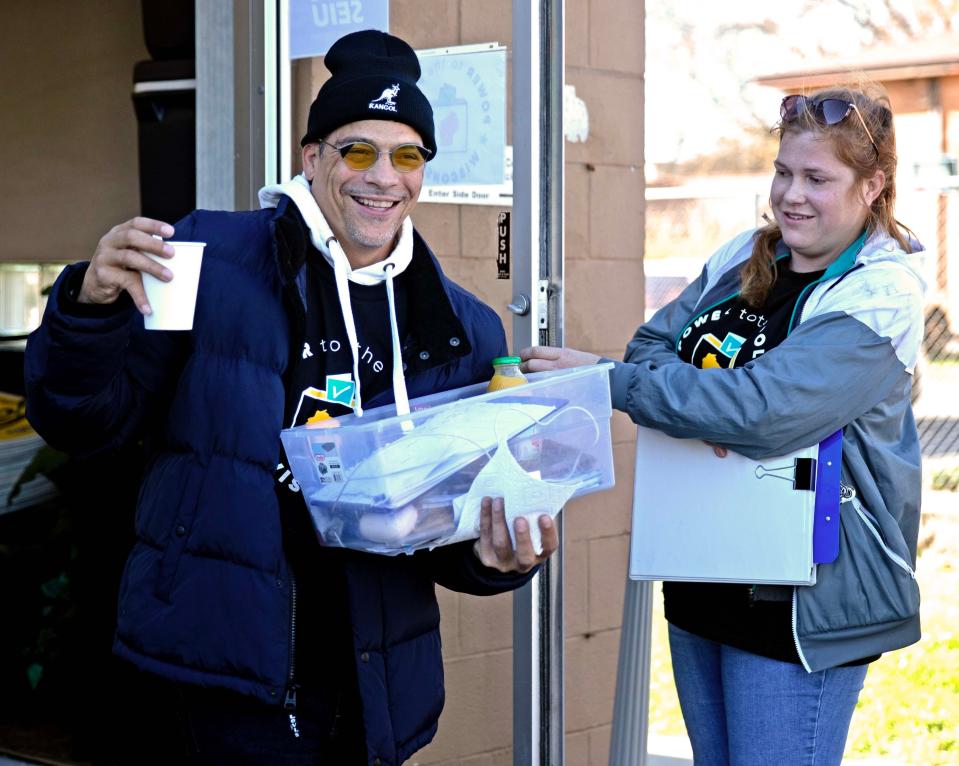
'The effort that it takes to vote'
Roberts' lifelong engagement with voting is driven, in part, by her sons, who attended public schools in Milwaukee and "made it in the city as young Black men," she said.
"They made it not incarcerated and not caught up by the system. But we had to work hard for that," she said. "And I knew it meant casting ballots and making sure that we’re on top of our game paying attention to what people are doing to us.”
Moore, who has been knocking on voters' doors in Milwaukee for decades, said when considering what moves turnout in the city, socioeconomics can’t be ignored.
She said some middle-class Black Milwaukeeans moved out of the inner city, leaving a voting bloc of lower-income households, who move more often or may need to work day and night shifts on Election Day.
She said she's found going door to door that many of the people have only recently moved in. The mobility hampers candidates' efforts, and can make it harder for residents to stay up to date on their voter registration.
“When I think about the effort that it takes to vote, it really is a middle-class thing,” the Democratic congresswoman said. “It is structured in that way. You know, if you're not fortunate enough to (be) like (me) ... I live on the block where my polling site is, and it has always been there.”
“You might see a ward that is predominantly Black, but what’s the income distribution of those Blacks that continue to live in that neighborhood? How many homeowners live there versus a renter?” she said.
Roberts said her voting advocacy for Democrats started, in part, to ensure voters facing such hurdles make it to Election Day. She now works with Power to the Polls, an arm of Service Employees International Union focused on voter education and turnout.
“And, you know, we really are being treated less than, and that’s not fair,” she said. “And so I want to do something about that rather than just complain about it.”
Roberts' husband recently died, and her children have been trying to convince her to move out west to be closer to them. But she is staying put for now.
“I've been contemplating stopping doing this work, but then there's always something that gets thrown back, whether it’s (gerrymandering), whether it's taking a polling place away. I can't stop because they won't let me.”
Jessie Opoien of the Milwaukee Journal Sentinel contributed to this report.
Molly Beck and Eva Wen can be reached at [email protected] and [email protected].
A grant from the Pulitzer Center supported reporting for this report. All work was done under the guidance of Journal Sentinel editors.
This article originally appeared on Milwaukee Journal Sentinel: In Milwaukee, Black voters low on enthusiasm for 2020 rematch
